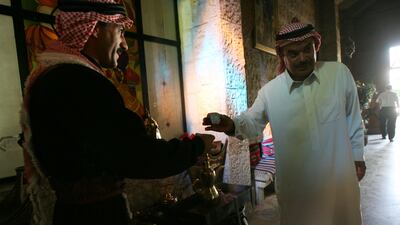Gulf officials and business executives pledged on Tuesday to explore investment opportunities in Jordan.
Political differences in recent years marred ties between Amman and Gulf Co-operation Council members Saudi Arabia and Qatar. The coronavirus pandemic also affected the investment environment in Jordan.
Jordan’s economy has been stagnant for the last 12 years, with unemployment officially at around 22 to 23 per cent.
“Our leadership has told us to concentrate on investing in Jordan,” Hamdan Al Samreen, head of the Saudi-Jordanian Chamber of Commerce told a business forum in Amman.
“We are very interested,” he said.
The forum, regarded as a liaison between Jordanian and Gulf businesspeople, convened twice before, in 2017 and in 2015.
Saudi Arabia is Jordan’s biggest overseas investor, with $12 billion of commercial investments there, according to the Jordan Chamber of Commerce.
Saudi Arabia is also one Jordan's biggest donors and the only Gulf country that shares a land border with Jordan.
The two countries differed on how to deal with the Syrian government of Bashar Al Assad, as Jordan became a transit centre for Captagon and other drugs smuggled from Syria to the interior of the Arabian Peninsula.
But in June, Saudi Crown Prince Mohammed bin Salman met King Abdullah II of Jordan in Amman. The visit coincided with the Saudi Public Investment Fund reactivating a $400 million hospital and university project in Jordan.
It was their first meeting since March 2021.
Differences between Jordan and Qatar, which were complicated by the rift between Qatar and other Gulf states, have also eased in the past two years.
Sheikh Khalifah bin Jassem Al Thani, head of the Qatar Chamber of commerce, said Gulf states are “always ready” to help to improve the Jordanian economy.
Foreign investment in Jordan was $726 million in 2021, up form $719m the previous year, but well below a 2006 peak of $3.6 billion, according to UN data.
Mohammad Al Mazzrouiy, head of The Arab Authority for Agricultural Investment and Development, a Middle East fund that invests in farming projects, expected Gulf sovereign wealth funds to start investing in Jordan's farming sector.
“The Ukraine war has drawn attention to the food security issue in the region,” Mr Al Mazzrouiy said.
Suleiman Al Dakheel, head of the Gulf Health Council, said Jordanian firms can also compete to supply GCC states with medicine under a unified tender platform developed by the GCC states.
“I invite all of Jordan's pharmaceutical companies to register on the platform,” he said, pointing out that eight Jordanian pharmaceutical companies out of 25 are not on the online system.
Official Jordanian data shows that the GCC accounted for 20 per cent of Jordan's $6.2bn of exports last year.
Abdulrahman Al Thobaity, head of the Kemyan, a Saudi fertiliser manufacturer, said that his company has been importing more raw material from Jordan in the past three years as supplies from India and China became more difficult to obtain.
“We are doing more business with the Jordanian suppliers,” he said. “But they have raised their prices.”


